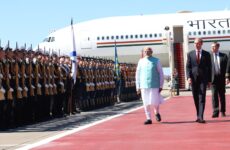Kabul, A power-sharing deal signed by presidential rivals Ashraf Ghani and Abdullah Abdullah ended the months-long dispute in Afghanistan, paving the way for a National Unity Government that will see both the key leaders at the helm.
The deal has put an end the weeks of political deadlock after both the candidates claimed victory in the June 14 presidential run-off election, accusing each other of manipulating the results by fraud.
As US hailed the unity deal, congratulating the two leaders, the Taliban slammed it as a “sham” staged by America.
“Installing Ashraf Ghani and forming a bogus administration will never be acceptable to the Afghans,” the Reuters quoted Afghan Taliban spokesperson as saying.
“The Americans must understand that our soil and land belong to us and all decisions and agreements are made by Afghans, not by the U.S. foreign secretary or ambassador.
Just hours after signing the power-sharing pact, that was broadcast live on national television, the former finance minister Ashraf Ghani was declared as the next President and Dr Abdullah Abdullah was appointed as the Chief Executive Officer (CEO) – a new post with powers similar to that of a PM.
Both the candidates were seen embracing each other after signing the deal at the presidential palace as the incumbent President Hamid Karzai watched.
“The Independent Election Commission declares Dr Ashraf Ghani as the president, and thus announces the end of election process,” IEC chief Ahmad Yousaf Nuristani told reporters.
However, IEC did not release the final tally of votes ithat were counted meticulously in a UN-supervised audit, that was brokered by US Secretary of State John Kerry.
For, according to a New York Times report, Mr Abdullah had insisted that he would sign the deal only if the results of the vote audit were not released to public, as they were “tainted by fraud”.
Hours after being appointed the President-elect, Ashraf Ghani took to Twitter to thank all and vowed to work for a better and prosperous Afghanistan.
According to a Reuters report, Ghani is expected to be sworn in as president on Sept. 29.
Months of dispute over the election results had threatened to pull the country back into the disastrous times of 1990s and emboldened Taliban, that attempted to cash in on the political uncertainty by launching attacks and raids.
The new government faces a tough task ahead as the US troops are set to withdraw by the end of the year, leaving the security’s onus on Afghan forces.
One of the foremost tasks on the new government’s shoulder is to sign the Bilateral security Agreement (BSA) with the US, which will allow some US troops to stay back in Afghanistan to train the security forces as the foreign troops are set to withdraw by the end of this year.
The BSA deal, which is also necessary for the continued flow of aid to the cash-strapped war torn country, was refused by the incumbent President Hamid Karzai. However, both Ashraf Ghani and Abdullah Abdullah had during their campaigning, promised to sign the deal.
Hailing the signing of the power-sharing pact, the US Secretary of State John Kerry congratulated the two leaders and commended them for having “put the people of Afghanistan first”.
“Ghani & Abdullah put the people of #Afghanistan first and ensured that the first peaceful democratic transition in history of country begins with national unity,” Kerry said in another tweet.




 Driving Naari Programme launched in Chandigarh
Driving Naari Programme launched in Chandigarh






























